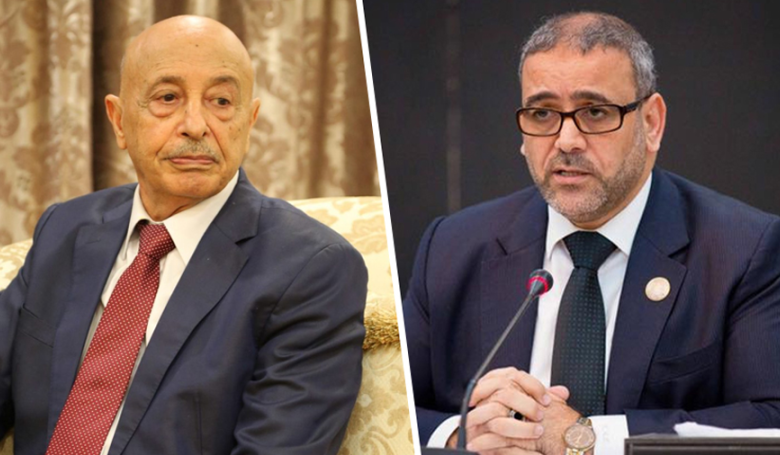Al-Mishri to Aguila Saleh: Appointing members to the Constitutional Court is invalid

The Speaker of the High Council of State in Libya, Khaled Al-Mishri, affirmed his adherence to the ruling of the Constitutional Chamber of the Supreme Court and the unconstitutionality of the law issued by the House of Representatives regarding the establishment of a new constitutional court based in the eastern city of Benghazi. This stance was expected, especially since Al-Mishri had previously objected to it and called on judges to boycott this court before announcing the suspension of negotiations with the Parliament until it reverses its decision.
Last Monday, the official spokesperson for the House of Representatives, Abdullah Bilheg, announced that the Council had unanimously voted to select the President and members of the Constitutional Court in accordance with Law No. (0) of 2023. He stated that the session was held as a “formal closed” session, under the chairmanship of the Second Deputy Speaker of the Council, Misbah Douma.
Bilheg did not disclose the names of the President and members of the Constitutional Court who were voted on unanimously in his statement published on the website of the House of Representatives. He also did not mention the number of MPs who attended the session.
In a letter addressed to the Speaker of the House of Representatives, Aguila Saleh, and published by the Media Office of the Council on Saturday night/Sunday, Al-Mishri expressed his surprise at the House of Representatives’ decision to appoint members of the Constitutional Court “during the Eid holiday.”
He stated, “We remind you that the Constitutional Chamber of the Supreme Court had ruled in our constitutional challenge No. (70/5) on the unconstitutionality of Law No. 5 of 2023. It is not hidden from you that the ruling of the Constitutional Chamber of the Supreme Court is final and enforceable.”
Al-Mishri reiterated his Council’s adherence to the ruling of the Constitutional Chamber and called on the Speaker of the House of Representatives to work towards completing the electoral process by expediting the issuance of the agreed-upon laws by the members of the 6+6 Committee, according to a clear roadmap.
The issuance of the law by the House of Representatives in early December sparked widespread controversy in Libyan circles, as the State Council decided to suspend communication with the House of Representatives and filed a case before the Supreme Court. Eventually, the heads of both councils, Saleh and Al-Mishri, announced in a joint statement at the end of December that they agreed “not to issue the law regarding the establishment of the Constitutional Court to avoid any conflict between this law and the outputs of the constitutional basis.”
Despite the Supreme Court’s announcement, at the beginning of last March, of accepting Al-Mishri’s appeal against the Parliament’s law regarding the establishment of a constitutional court and the unconstitutionality of the law, the Parliament published the text of the law in the official gazette in early April, indicating its enforcement and implementation.
The Parliament’s decision to appoint the president and members of the constitutional court has sparked controversy among the deputies. Around forty deputies have threatened to boycott Parliament sessions and hold parallel sessions in Tripoli, protesting what they described as the Parliament’s control over the Council’s decisions.
The 40 deputies, in a statement, considered the session held by the Parliament’s presidency last Monday as a “violation” of what the Council’s presidency announced during its sessions the previous week, stating that sessions would be suspended until after Eid al-Adha. They deemed the session held last Monday as “null and not meeting legislative or parliamentary standards,” and described it as “disregard and an attempt to weaken the Parliament.”
The signatory deputies gave the Parliament’s presidency a deadline to cancel the decisions made during the session, no later than the date of the consultative session held in Tripoli, which “will be decisive in the Parliament’s history.”
In addition to judicial matters, the Parliament voted on several decisions in its last session, including the dismissal of the head of the Administrative Control Authority and the selection of a new president, as well as the dismissal of the president and members of the Board of Directors of the National Planning Council and the selection of a new council.
The Parliament’s insistence on challenging the authority of the Supreme Court, which had previously ruled it unconstitutional in 2014, threatens to divide the judiciary that has remained unified throughout the years of division among the country’s legislative, executive, and sovereign institutions.
The steadfastness of each party in its position will lead to the existence of two almost identical judicial institutions, the constitutional division under the Supreme Court in Tripoli and the Supreme Constitutional Court in Benghazi.
The division of the judiciary will hinder the holding of elections, as there will not be a unified judicial body to adjudicate matters related to elections.
For years, Libya has witnessed disputes among its main political institutions on several issues, including holding elections, forming governments, and the duplication of state institutions.












